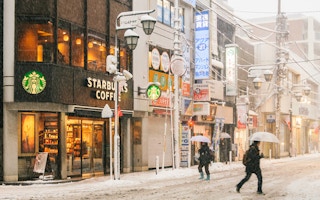It is not every day that a leading contact lens manufacturer would end up converting used ground coffee to become cattle feed.
To continue reading, subscribe to Eco‑Business.
There's something for everyone. We offer a range of subscription plans.
- Access our stories and receive our Insights Weekly newsletter with the free EB Member plan.
- Unlock unlimited access to our content and archive with EB Circle.
- Publish your content with EB Premium.
But Japanese firm Menicon has emerged with the solution for Starbucks Coffee Company’s discarded coffee beans. By feeding them to the cows that give them the milk that they use in their lattes, the life of the coffee beans has come full circle.
Although composting is known as an eco-friendly practice, Menicon said the used coffee grounds, also known as bean cakes, have a significant nutritional value that could be put to better use than just ending up in the soil.
While experimenting in 2011 with rice straws as part of its research on bioplastic or organic materials to be used in the production of contact lenses, Menicon developed various fermentation technologies, one of which turned out to be useful in turning the bean cakes into food that can be fed to cows, the company said in a statement.
The eye solutions provider then partnered with the veterinary medicine department of Azabu University to develop the cattle feed. The coffee bean cakes when fermented, through the lactic acid fermentation technique, and then fed to cows, result in milk with lower somatic cell count – a key indicator of high quality dairy products, explained Menicon.
Here is Menicon’s infographic of how Starbucks Coffee closes the loop of its coffee beans.
The company said it successfully produced a feed that is suitable for long-term storage and is able to help cows produce quality milk. Last year, Menicon and Starbucks teamed up with waste recycling company Sanyu Plant Service to jointly apply for a patent and to produce the fermented feed.
But the story does not end with the cattle feed. Collecting the bean cakes from 1,000 Starbucks coffeehouses all over Japan was also a challenge, as the company needed to collect them in the most hygienic way without incurring more storage and transport costs, and to minimise its carbon footprint, it said.
Starbucks and Menicon found the solution which involved placing a special storage area in refrigerated trucks that deliver chilled products to the coffee stores, then collecting the waste before the trucks return to Starbucks’ distribution centers. The trucks drop the accumulated waste at few contact points where Sanyu can economically deliver it to the recycling plant.
Tokyo was an ideal location for this initiative as it is deeply saturated with Starbucks coffeehouses and its compact nature made it viable for Starbucks to collect the waste while saving on transportation fuel.
Now, some Starbucks coffee outlets in Japan uses milk that came from the cows which fed on its coffee grounds. Menicon said it is just what they had envisioned - an enterprise that’s friendly to people, animals and the environment - that is, happy cows, happy coffee drinkers, and a happy environment.










